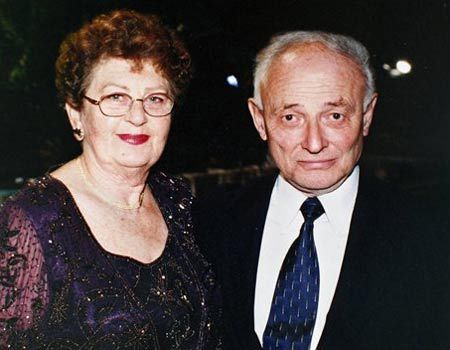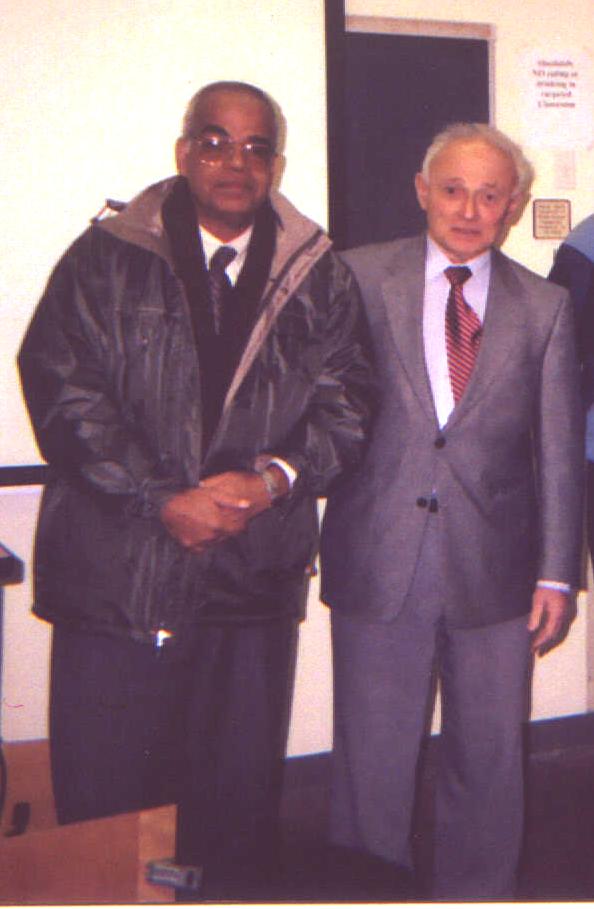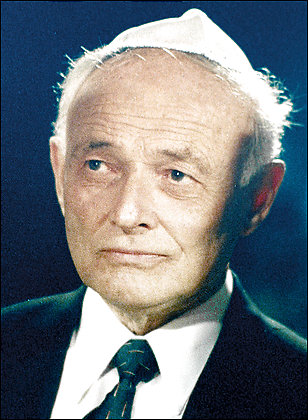|
|||||
 |
 |
|
 |
 |
|
In Memoriam: Liviu
Librescu
Silvio Levy |
|
Vol. 2 (2007), No. 7, 1205–1206
|
Abstract |
|
In this issue we publish posthumously an article coauthored by Liviu Librescu (1930–2007). This unassuming man stood out not only as a research pioneer in many fields, but as an accomplished, warm, and generous teacher and human being. Since 1986 he had been a Professor of Engineering Science and Mechanics at the Virginia Polytechnic Institute and State University in Blacksburg, VA, where he lost his life on April 16 while saving those of his students. He left behind his wife Marlena (photo) and his sons Aryeh and Joe. 
Born in Ploieşti, Romania, a mere seven years after the Jewish residents of that country achieved equality of rights, he soon saw those rights taken away as the Nazi-aligned Legionnaire regime took over. His father spent years in labor camps and the family survived great hardship. After the War, Librescu continued his studies and graduated in 1953 from the Faculty of Aeronautical Engineering of the Bucharest Polytechnic Institute. He then started his fecund research career at the Institute of Applied Mechanics of the Romanian Academy of Science in Bucharest, at first working on elastic shells but soon branching out into fluid mechanics and aeroelasticity. In 1969 he obtained a Ph.D. from the Institute of Fluid Mechanics of the same Academy. In the 1970s he was again the target of government persecution, for refusing to pledge allegiance to the communist regime and for trying to move to Israel. He was finally allowed to emigrate in 1978, after the intervention of Israel's Prime Minister, and joined the faculty of Tel-Aviv University. In 1985–86 he spent a sabbatical at Virginia Tech and was offered a professorship, so he moved to the United States and there continued his research in aeroelasticity, thermal stresses and composite materials. With 250 refereed journal articles in French, German, English and Russian, an equal number of contributed book chapters and proceedings articles, and a handful of research monographs, Librescu is surely one of the most published authors in the field. Librescu's heroism during the Virginia Tech murders has been amply chronicled. He was buried in Israel with honors, and was equally recognized in Romania, whose president conferred on him on April 18 the highest civil order of that country, the Star of Romania (Grand Cross rank), for his scientific accomplishments and his selflessness. We asked his coauthor Karam Y. Maalawi, as well as his colleagues from Virginia Tech, to write a few words in his memory, and we reproduce them here. With great sorrow and deeply saddened heart, we mourn the passing away of our teacher, mentor and friend Professor Liviu Librescu. Professor Librescu, a pioneer in the field of aerospace engineering, helped me a great deal during my stay in Virginia. His scientific guidance was invaluable to our research work. Librescu's generosity extended to several of my colleagues at Virginia Tech in addition to myself. Such was his kindness and love. His memory will remain with me the rest of my life, and I promise to continue the work we planned to complete. God rest his soul. Karam Y. Maalawi 
Liviu Librescu died as he lived, devoted to his students and his profession. He loved his position as professor, and gave himself to research and teaching, solely for the love of it. His son, Joe, says it best: “He was a scientist who did not work for money, but for the pleasure he got from his occupation.” Always available to students, a caring teacher and inspiring graduate advisor, his last act was to sacrifice himself to save the students in his solid mechanics class. On that gruesome morning, he blocked the door of 204 Norris Hall with his body and ordered his students out the window. He saved all but one, and fell at last, pierced by several bullets. We are thankful for all the years we had with him at Virginia Tech. It was fortunate for us that he chose to spend his 1985 sabbatical in our Engineering Science and Mechanics Department, and accepted the department's invitation to join us permanently. He was a helpful colleague, always ready to talk about research with anyone. His attitude towards the profession was based on a deep devotion to knowledge. We miss him greatly. We will fulfill our mission with increased resolve in order to honor his memory. He will not be forgotten. 
|
Milestones
Published: 1 September 2007
|
Authors |
| Silvio Levy | |
| Mathematical Sciences Research
Institute 17 Gauss Way Berkeley, CA 94720-5070 United States |
|
 |
